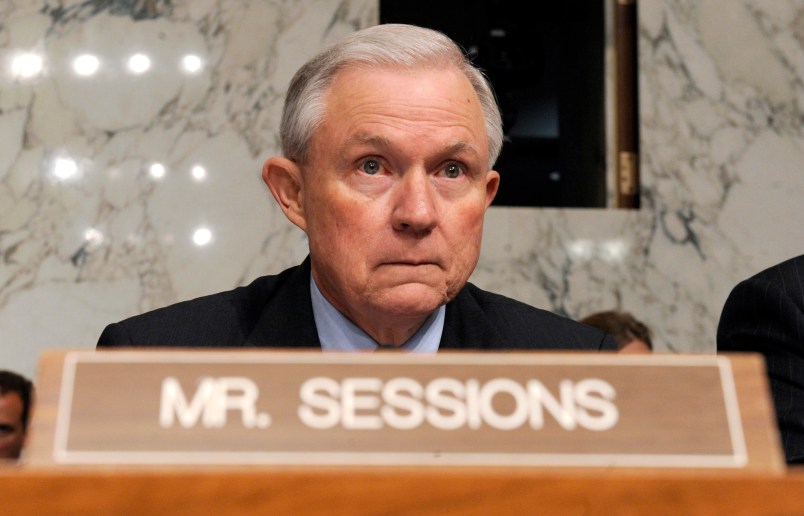Like many in the Trump administration, Attorney General Jeff Sessions’ views on Russia have shifted over time.
As a senator from Alabama, Sessions was a Russia hawk who cautioned that President Vladimir Putin posed a risk to the security of Europe and the United States. By March 2016, when he joined Donald Trump’s campaign as a senior national security adviser, he began moderating that language, casting doubts on reports that Russia was behind the hacks of Democratic organizations and operatives last summer and claiming closer ties between Putin and the next President would be beneficial.
Comments Sessions made on Russian interference in the U.S. election during his confirmation hearing, in particular, are under a microscope after the Washington Post revealed Wednesday that he failed to disclose two conversations he had with Russian ambassador Segey Kislyak during the campaign. Sessions was one of Trump’s closest allies on Capitol Hill at the time, while investigations into Russia’s involvement in the election already were underway.
Here’s a rough timeline of Sessions’ comments on Russia and election interference:
March 17, 2016: Less than two weeks after officially joining the Trump campaign, Sessions said at a breakfast hosted by the American Council for Capital Formation that closer ties with Russia should be part of a “more realistic, pragmatic foreign policy.”
“I think an argument can be made there is no reason for the U.S. and Russia to be at this loggerheads,” he said. “Somehow, someway we ought to be able to break that logjam. Strategically it’s not justified for either country. It may not work. Putin may not be able to be dealt with, but I don’t condemn his instincts that we ought to attempt to do that.”
July 31, 2016: Days after Trump invited Russia to hack Hillary Clinton’s campaign emails, Sessions told CNN’s Jim Acosta that the Democratic candidate left her email system “totally vulnerable to a Russian penetration” and said it was “clear that they have what was on that system.”
“This whole problem with Russia is really disastrous for America, for Russia and for the world,” he continued. “Donald Trump is right. We need to figure out a way to end this cycle of hostility that’s putting this country at risk, costing us billions of dollars in defense, and creating hostilities.”
Sep. 27, 2016: During a CNN interview, Sessions backed Trump in casting doubt on U.S. intelligence assertions that Russia was behind cyberattacks during the campaign.
“I haven’t had briefings that indicate with any clarity that Russia is doing this,” he said.
“They are highly sophisticated in cyber warfare, as are the Chinese, as are even North Koreans and Iranians. So this is a threat to us,” Sessions continued. “And I think Donald Trump handled it well. He said we don’t know for sure how that happened. It’s not acceptable for Russians to be doing that kind of thing. They should not be impacting in any way within the presidential elections. But cyber security breaches are occurring throughout industry, throughout politics, throughout our most sensitive defense systems, and it’s a big trouble—or problem for us. We’ve got to fix that and get a lot better fast.”
Oct. 19, 2016: Sessions told Fox Business host Lou Dobbs that information made public by radical transparency organization WikiLeaks, which published many of the emails hacked from Democratic operatives by Russia, was fair game.
“Once these—this data, information is out there in the public realm, all of us should have to deal with it,” he said. “That’s—suppose the Pentagon papers were not to be read by anybody because they were illegally produced.”
“We just have to operate in the world we’re living in, it seems to me,” he added.”
Jan. 10, 2017: Sessions faced a number of questions on Russia’s interference in the election during his Senate confirmation hearing.
Asked by Sen. Al Franken (D-MN) how he would respond to evidence “that anyone affiliated with the Trump campaign communicated with the Russian government in the course of this campaign,” Sessions said he personally did no such thing.
“I’m not aware of any of those activities,” he said. “I have been called a surrogate at a time or two in that campaign and I did not have communications with the Russians, and I’m unable to comment on it.”
Sessions was similarly cagey in an exchange about Russia’s cyberhacking efforts with Sen. Lindsey Graham (R-SC), saying he has not been briefed on the subject and only knows “what the media says about it.”
He later gave a more straightforward response to Sen. Amy Klobuchar (D-MN), who asked if he agreed with the intelligence community’s assessment on Russian hacking.
“I have no reason to doubt that and no evidence of anything otherwise,” Sessions said.
Jan. 23, 2017: In written responses to members of the Senate Judiciary Committee, Sessions said he was “not aware of a basis to recuse myself” from probes involving Trump, including those regarding Russian interference into the election and former national security adviser Michael Flynn’s reported communications with Kislyak.
“I am not aware of a basis to recuse myself from such investigations,” he said. “However, if a specific matter arose where I believed my impartiality might reasonably be questioned, I would consult with Department ethics officials regarding the most appropriate way to proceed. As I made clear at my confirmation hearing, I will always be fair and work within the law and the established procedures of the Department.”






